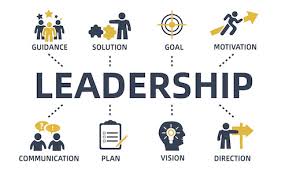The Qualities of Effective Leaders
Leaders play a crucial role in guiding individuals and organizations towards success. Effective leaders possess a unique set of qualities that inspire and motivate others to achieve common goals. Here are some key characteristics that define exceptional leaders:
Visionary
A great leader has a clear vision of the future and can articulate this vision to their team. They inspire others with their ideas and motivate them to work towards a common objective.
Empathetic
Empathy is an essential trait for leaders as it allows them to understand the perspectives and emotions of those they lead. Empathetic leaders build strong relationships based on trust and mutual respect.
Decisive
Effective leaders are decisive in making tough decisions, even in challenging situations. They weigh the pros and cons carefully, but ultimately take action to move forward.
Communicative
Communication is key for successful leadership. Leaders must be able to convey their vision, expectations, and feedback clearly to their team members. Open and honest communication fosters transparency and collaboration.
Adaptable
In a fast-paced world, adaptability is crucial for leaders. They must be flexible in response to changes, willing to learn new skills, and open to innovative ideas.
Inspirational
An inspirational leader motivates others through their actions, words, and attitude. They lead by example, setting high standards for themselves and inspiring others to reach their full potential.
In conclusion, effective leaders possess a combination of vision, empathy, decisiveness, communication skills, adaptability, and inspiration. By embodying these qualities, leaders can successfully guide their teams towards achieving shared objectives and driving positive change.
6 Essential Tips for Effective Leadership: Inspire, Communicate, and Grow
- Lead by example and practice what you preach.
- Communicate clearly and effectively with your team.
- Listen actively to understand different perspectives and ideas.
- Empower your team members and delegate tasks appropriately.
- Provide constructive feedback and recognize achievements.
- Continuously learn and improve your leadership skills.
Lead by example and practice what you preach.
Leading by example and practicing what you preach are fundamental principles of effective leadership. When leaders embody the values and behaviors they expect from their team members, they establish credibility and trust. By demonstrating integrity, commitment, and accountability in their own actions, leaders inspire others to follow suit. This approach creates a culture of authenticity and fosters a sense of unity and purpose within the team. Ultimately, leading by example not only sets a standard for excellence but also motivates others to strive for their best performance.
Communicate clearly and effectively with your team.
Clear and effective communication is a fundamental aspect of successful leadership. When leaders communicate openly and transparently with their team members, they foster trust, collaboration, and understanding. By articulating goals, expectations, and feedback in a concise and understandable manner, leaders ensure that everyone is on the same page and working towards a common objective. Effective communication also allows for the exchange of ideas, constructive feedback, and problem-solving, ultimately leading to improved team performance and cohesion. Leaders who prioritize clear communication create a positive work environment where individuals feel valued, heard, and empowered to contribute their best work.
Listen actively to understand different perspectives and ideas.
Active listening is a crucial skill for effective leaders as it allows them to truly understand diverse perspectives and ideas within their team or organization. By attentively listening to others without judgment and showing genuine interest in their viewpoints, leaders can foster a culture of open communication, trust, and collaboration. This practice not only helps in gaining valuable insights but also demonstrates respect for the opinions of others, ultimately leading to more informed decision-making and stronger relationships within the team.
Empower your team members and delegate tasks appropriately.
To be an effective leader, it is essential to empower your team members and delegate tasks appropriately. By empowering individuals within your team, you not only foster a sense of ownership and responsibility but also encourage creativity and innovation. Delegating tasks based on each team member’s strengths and skills not only lightens your workload but also helps in developing their capabilities and boosting their confidence. Trusting your team to handle responsibilities shows that you value their contributions and believe in their abilities, ultimately leading to increased productivity and a more cohesive work environment.
Provide constructive feedback and recognize achievements.
Providing constructive feedback and recognizing achievements are essential practices for effective leaders. Constructive feedback helps individuals improve their performance by highlighting areas for growth while offering guidance and support. By providing specific and actionable feedback, leaders empower their team members to reach their full potential. Additionally, acknowledging and celebrating achievements fosters a positive work environment, boosts morale, and motivates individuals to continue striving for excellence. Leaders who prioritize both constructive feedback and recognition create a culture of continuous improvement and appreciation within their teams.
Continuously learn and improve your leadership skills.
Continuously learning and improving your leadership skills is essential for staying relevant and effective in a rapidly changing world. Leaders who prioritize self-improvement not only enhance their own capabilities but also inspire those around them to strive for growth and excellence. By seeking out new knowledge, embracing feedback, and honing their leadership abilities, individuals can adapt to evolving challenges, foster innovation, and drive positive outcomes within their teams and organizations. Embracing a mindset of lifelong learning not only benefits the leader personally but also contributes to the overall success and resilience of the entire team.




